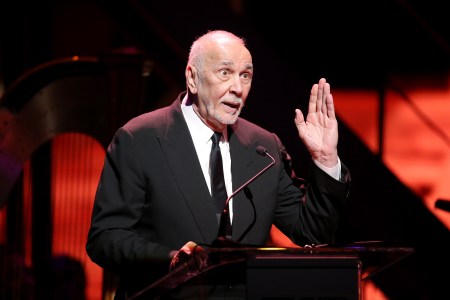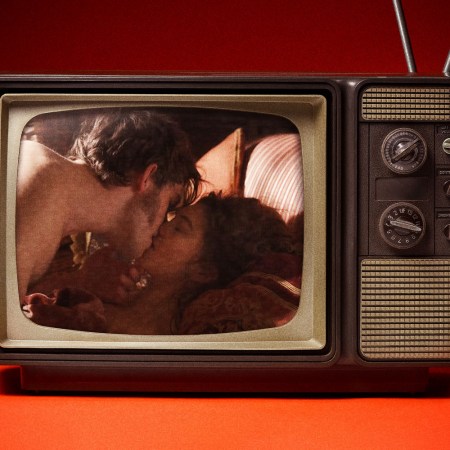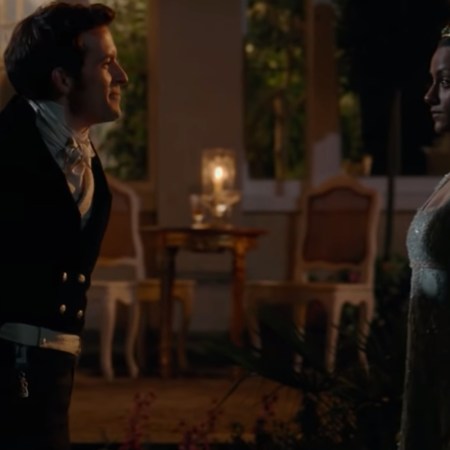The filmmaker Ira Sachs doesn’t quite remember the first time he saw a naked body on screen, but he’s fairly certain it was early on in his childhood, definitely before the age of 13. He grew up as a child of divorce in the ‘70s, an era of maturing subject matter in the American cinema, which became a curriculum spread across his afternoons with Dad.
“He’d take us to movies of all stripes, and if it was R-rated, he’d buy us the tickets, sit us down, then sneak out and disappear for 90 minutes before coming back to pick us up,” Sachs tells InsideHook via Zoom. He watched lots of the biggies of the day this way: Dog Day Afternoon, The Conversation, Patton, Death Wish. (“That one was probably a little too much for me at the time when it first came out,” he admits.) The defining works of this period took a bracingly frank stance on politics, race, violence and most formatively for the wide-eyed young Sachs, sex. Skin was in, and though moral watchdogs sounded their harrumphs, Hollywood held their ground. And judging by the handsome box-office receipts all but unthinkable for grown-up original-concept films in the present day, the public lapped it up.
His latest and most widely acclaimed film Passages transposes the macho grit of those road-to-Damascus classics to a softer and more sensual key, while following their example of unsparing rawness. Growing bored with his prim ’n’ proper British husband Martin (Ben Whishaw), terminally narcissistic German movie director Tomas (Franz Rogowski) strikes up with unformed French beauty Agathe (Adèle Exarchopoulos) in an affair he doesn’t even bother hiding. A poison-tipped love triangle forms over the following 90 minutes of shouting matches and reconciliations, drawing out the tenderest agonies from a European Union of characters fluent in the lingua franca of passion. As in so many hot-and-cold romantic entanglements, sex plays a significant role in the inadvisable yet inexorable choice to maintain the cycle of splitting up and making up; Sachs describes them as “exposing themselves, both as emotional and physical beings.” But the ‘70s, as he’s learned the hard way, were a long time ago.
Much of the coverage surrounding Passages has pertained to the Motion Picture Association of America’s rare bestowing of an NC-17 rating, effectively barring this title to all minors during its stateside theatrical run. (In Spain, as Sachs has repeatedly pointed out while working the press circuit, screenings are open to viewers of 12 years or older.) He explains that the ruling, which comes only after a distributor submits a film along with a mandatory fee, does not elucidate the reasoning for their decision unless specifically requested after it’s already been handed down. One may reasonably assume that the copious and candid sex scenes, which include a rather unshy glimpse at Whishaw’s private anatomy, sent the MPAA clutching for their pearls. At the same time, what Sachs articulates as a “round robin of lust and possibility” has come as a tonic to a faction of viewers starved for eroticism, and reignited an unending conversation about who gets to get off, and how, and why.
Sachs refers to the MPAA, which he’s quick to mention was founded by the same Catholic leaders behind the repressive Hays Code, as “beyond useless” and “a body of control which should be actively opposed.” Though he correctly notes that depictions of sexuality for women and queer characters have historically received finer scrutiny than those for men, he’s less concerned with the question of why a given film gets an NC-17 than the basic premise of the MPAA’s authority. In discussing this locking of cultural horns, he’s often bandied about the concept of censorship, which I try to politely push back against. After all, a proudly unrated Passages will indeed run in nationwide theaters through this month, which he counters with the accurate assertion that the total number of screens will be far fewer than an R rating would’ve gotten him. The MPAA’s punishment takes the form of diminished earning potential, though when I point out that this whole kerfuffle has brought Passages more attention and headlines than it would’ve drawn otherwise, he states simply, “Yeah, that’s not interesting to me.”
In 1969, an X rating turned Midnight Cowboy into a word-of-mouth phenomenon and Academy Award winner, but Sachs suspects that the equivalent NC-17 will marginalize his work. Showing the mechanisms of sex steepens the uphill climb of getting any film produced, dependent as it is on people with little invested in the difference between what’s graphic and what’s realistic. “It’s at every stop along the way,” he says. “It’s when you try to get things financed, get into festivals run by older straighter men, get a theatrical date. You face a lot of walls, and only some of them have doors, and only some of those doors can be opened. And I speak from the perspective of a white man, who’s been able to make a lot of movies in the past. I’m at an advantage. Imagine how other people with less power fare when trying to get their work made and seen. For so many people, it’s nearly impossible.” When I agree that America’s artistic output has become desexed at large, he interrupts to clarify: “You can just say it’s bad. It is bad. Let’s start there.”
Why Frank Langella Is Wrong About Intimacy Coordinators
In a new op-ed, the actor claims he’s been “canceled” after failing to adhere to an intimacy coordinator’s blocking during a love sceneIn the case of Passages, the commitment to coitus cannot be separated from the smoldering essence of the film. Sachs was inspired by the human impulse “to find pleasure, to have pleasure, and then to give pleasure,” and he felt plenty of it in his collaboration with a cast he admired “as individuals, but also as bodies and shapes.” When we speak, he’s just finished printing a book collecting the on-set photographs of his gorgeous leads that he couldn’t stop snapping. He calls Exarchopoulos the Jeanne Moreau of our time, a woman “of the earth and sky”; he wrote Rogowski’s role with the actor in mind after seeing him perform a rousing rendition of Sia’s “Chandelier” in 2018’s Happy End, a specimen of “cinema at its most extraordinary, like a burlesque, everything out there in the most amazing way.” As Sachs puts it, their game attitude toward shooting intimacy was of a piece with “a style of acting that could be called non-American, about detail over statement, silence as valuable as speech.”
Whether languid or fired up, the tussles in bed allow the ill-fated lovers to convey themselves on a deeper and more primal level than mere words could access. There’s a familiarity in the physicality between Whishaw and Rogowski, in contrast to the excited, eager sense of discovery in his first hookup with Exarchopoulos. The particulars — the sounds, the positions, the passage of time — of these segments matter, rich with telling detail that would be lost if left to intimation or suggestion. Looking back on landmarks of the explicit like Je Tu Il Elle, Taxi Zum Klo and the oeuvre of Pier Paolo Pasolini, Sachs came to see sexuality as the medium in which we all live, the water to the fish. “You have to remind yourself that you can still create images that your time doesn’t permit,” he says.
That’s a lesson he’s now trying to impart to his own kids, as he raises them (in a lovingly unconventional co-parenting setup with the documentarian Kirsten Johnson, who birthed the children) on the same balanced diet of challenging yet age-appropriate cinema that so nourished him as a boy. He says he wants to give them all the advantages of an asthmatic young Martin Scorsese, who sat rapt before the entire universe of the art form he learned to love. “Movies for kids can and should be good movies,” he says. “They need good stories. Comedy, noir, Mae West, everything. My kids are 11 and they’ve seen so many films because they can enjoy them, not because they think they have to or because it’s good for you. Though, of course, it is.”
In that childlike inquisitive what-makes-the-sky-blue spirit, I tie up our conversation by asking an impossible question about why the world is the way that it is: what is it about sexuality people find so threatening, anyway? “Well, that’s the big question,” he says with a laugh. “Ask Foucault!”
This article appeared in an InsideHook newsletter. Sign up for free to get more on travel, wellness, style, drinking, and culture.
























